[Part 2] Relevant Sanskrit Shlokas with Meaning in Hindi & English
This is part 2 of Relevant Sanskrit Shlokas with Meaning in Hindi & English. We will continue adding many more useful Sanskrit quotes here as we post them on our social channels.
Sanskrit Quote on Courage and Self-Reliance
Source - रामायण | २.२३.१६

वीराः सम्भावितात्मानः दैवं न पर्युपासते।
Transliteration (IAST):
vīrāḥ sambhāvitātmānaḥ daivaṃ na paryupāsate
Hindi translation:
जो साहसी और आत्मसम्मान से परिपूर्ण होते हैं,
वे कभी भी भाग्य पर निर्भर नहीं रहते।
English translation:
Those who are brave and full of self-respect
will not rely on destiny at all.
Reflection:
The brave do not wait at the doors of destiny. They move forward with trust in their own effort and resolve.
True strength does not seek permission from fate — it creates its own path.
Sanskrit Quote on Parenthood and Influence
Source - अष्टाङ्गहृदयम् | शारीरस्थानम् | १.३०

इच्छेतां यादृशं पुत्रं तद्रूपचरितांश्च तौ।
चिन्तयेतां जनपदांस्तदाचारपरिच्छदौ॥
Transliteration (IAST):
icchetāṃ yādṛśaṃ putraṃ tadrūpacaritāṃś ca tau
cintayetāṃ janapadāṃs tadācāraparicchadau
Hindi translation:
गर्भस्थ शिशु का मन गर्भधारण से पहले और गर्भाधान के समय
माता-पिता के विचारों से प्रभावित होता है।
English translation:
The mind of the foetus is influenced by the thoughts of its parents
prior to and during conception.
Reflection:
Children mirror what they see. Thoughts become actions, and actions become legacy.
Ancient wisdom reminds us that mindful parenting begins even before birth.
Sanskrit Quote on True Duty and Conduct
Source - हितोपदेशः - मित्रलाभः - ८

इज्याऽध्ययनदानानि तपः सत्यं धृतिः क्षमा।
अलोभ इति मार्गोऽयं धर्मस्याष्टविधः स्मृतः॥
Transliteration (IAST):
ijyā'dhyayanadānāni tapaḥ satyaṃ dhṛtiḥ kṣamā।
alobha iti mārgo'yaṃ dharmasyāṣṭavidhaḥ smṛtaḥ॥
Hindi translation:
यज्ञ करना, वेद पढ़ना, दान देना, तप करना, सत्य बोलना,
धीरज धरना, क्षमाशील होना और लोभ न करना — ये धर्म के आठ मार्ग हैं।
English translation:
Performing sacrifices, studying the Vedas, charity, penance, speaking the truth,
patience, forgiveness, and freedom from greed — these are the eight paths of duty.
Reflection:
True duty lies in conduct, not custom. By refining the mind and strengthening character,
the eight teachings of Hitopadeśa bridge self-welfare and social welfare.
Sanskrit Quote on Exercise and Endurance
Source - suśrutasaṃhitā 4.24.4

श्रमक्लमपिपासोष्णशीतादीनां सहिष्णुता।
Transliteration (IAST):
śramaklamapipāsoṣṇaśītādīnāṃ sahiṣṇutā
Hindi translation:
व्यायाम से श्रम, थकान, प्यास, गर्मी, सर्दी आदि के प्रति सहनशीलता बढ़ती है।
English translation:
Exercise increases tolerance against fatigue, exhaustion, thirst, heat, cold and alike.
Sanskrit Quote on Effort and Human Will
Source - सुभाषितरत्नभाण्डागारम् - २ | उद्यमप्रशंसा - १८

नात्युच्चशिखरो मेरुर्नातिनीचं रसातलम्।
Transliteration (IAST):
nātyuccaśikharo merur nātinīcaṃ rasātalam
Hindi translation:
जो यत्न करते हैं उनके लिए न तो मेरु पर्वत बहुत ऊँचा है
और न पृथ्वी की सबसे गहरी सतह अगम्य।
English translation:
For those who choose effort over excuse,
no peak is too high and no depth too unreachable.
Sanskrit Quote on Fear and New Beginnings

भयत्यागाद् हि प्रस्थानम्।
Transliteration (IAST):
bhayatyāgād hi prasthānam
Hindi translation:
भय का त्याग करने पर ही जीवन का आरम्भ होता है।
English translation:
Life begins when fear ends.
Reflection:
Fear is not always loud — it often hides in hesitation and comfort.
Every meaningful journey begins when we choose to step beyond it.
Sanskrit Quote on Virtue and Downfall
Source - हितोपदेश १.४१

निपात्यते सुखेनाधस्तथात्मा गुणदोषयोः।
Transliteration (IAST):
nipātyate sukhenādhastathātmā guṇadoṣayoḥ।
Hindi translation:
अच्छे गुणों से इंसान ऊपर उठता है,
लेकिन एक गलत काम की वजह से जल्दी ही गिर जाता है।
English translation:
One rises with good qualities
but falls quickly due to a single misdeed.
Sanskrit Quote on Enthusiasm and Possibility
Source - Rāmāyaṇa | Kiṣkindhākāṇḍa | 1.121

सोत्साहस्य लोकेषु न किञ्चिदपि दुर्लभम् ॥
Transliteration (IAST):
sotsāhasya lokeṣu na kiñcid api durlabham
Hindi translation:
जिस व्यक्ति में उत्साह हो, उसके लिए इस संसार में कुछ भी दुर्लभ या असाध्य नहीं है।
English translation:
There is nothing unattainable in this world for the enthusiast.
Sanskrit Quote on the Divine Union of Parvati and Parameshwara
Source - रघुवंशम् १|१

वागर्थाविव सम्पृक्तौ वागर्थप्रतिपत्तये।
जगतः पितरौ वन्दे पार्वतीपरमेश्वरौ॥
Transliteration (IAST):
vāgarthāviva sampṛktau vāgarthapratipattaye।
jagataḥ pitarau vande pārvatīparameśvarau॥
Hindi translation:
मैं पार्वती और परमेश्वर को नमस्कार करता हूँ, जो वाणी और उसके अर्थ की भाँति अविभाज्य रूप से एक हैं —
समस्त जगत के माता-पिता, जिनकी उपासना से वाणी और अर्थ का सच्चा ज्ञान प्राप्त होता है।
English translation:
I bow to Parvati and Parameshwara, the divine parents of the universe,
who are united like speech and its meaning, for the right understanding of both word and sense.
Sanskrit Quote on Winter
Source - ऋतुसंहार 5.16

शिशिरसमय एष श्रेयसे वोऽस्तु नित्यम्।
Transliteration (IAST):
śiśirasamaya eṣa śreyase vo'stu nityam।
Hindi translation:
यह शीत ऋतु आप सभी के लिए सदैव समृद्धि लेकर आए।
English translation:
May this winter season always bring prosperity to you all.
Sanskrit Quote on the Nature of the Noble
Source - नीतिशतकम् ३३

कुसुमस्तबकस्येव द्वयीवृत्तिर्मनस्विनः।
मूर्ध्नि वा सर्वलोकस्य विशीर्येत वनेऽथवा॥
Transliteration (IAST):
kusumastabakasyeva dvayīvṛttir manasvinaḥ।
mūrdhni vā sarvalokasya viśīryeta vane'thavā॥
Hindi translation:
फूलों की तरह, अच्छे लोग या तो सबके सिर पर शोभित होते हैं या जंगल में मुरझा जाते हैं।
English translation:
Like flowers, the noble either shine above all or fade unseen in the wild.
Sanskrit Quote on Rising to Glory
Source - Bhagavadgītā 11.33

त्वमुत्तिष्ठ यशो लभस्व।
Transliteration (IAST):
tvam uttiṣṭha yaśo labhasva
Hindi translation:
उठो और गौरव हासिल करो।
English translation:
Get up, rise and win glory.
Sanskrit Quote on Self Confidence
Source - क्रियासिद्धिः सत्त्वे ३

आत्मबलं स्मर बाहुबलं धर परमुखप्रेक्षी मा भूः।
Transliteration (IAST):
ātmabalaṃ smara bāhubalaṃ dhara paramukhaprekṣī mā bhūḥ।
Hindi translation:
आत्मबल को याद रखो। अपने बल को थामे रखो। अपने आप पर सबसे अधिक विश्वास रखो।
English translation:
Remember your strength. Hold your strength. Have faith in yourself.
Sanskrit Quote — Prajāsnehaḥ (Affection for His People)
Source - śāntiparva 68.59

राजा प्रजानां हृदयं गरीयो।
गतिः प्रतिष्ठा सुखम् उत्तमं च॥
Transliteration:
rājā prajānāṃ hṛdayaṃ garīyo।
gatiḥ pratiṣṭhā sukham uttamaṃ ca॥
Hindi translation:
राजा प्रजा का हृदय है; वह उनका महान आश्रय है;
वह उनकी महिमा है; और वह उनका महानतम सुख है।
English translation:
The king is the heart of the people; he is their great refuge;
he is their glory; and he is their greatest
happiness.
Sanskrit Quote on Dhananjaya’s Skill
Source - Mahābhārata | Droṇaparva | 83.21

सामरेष्वपि लोकेषु सर्वेषु न तथाविधः।
शरासनधरः कश्चिद्यथा पार्थो धनंजयः॥
Transliteration:
sāmareṣvapi lokeṣu sarveṣu na tathāvidhaḥ
śarāsanadharaḥ kaścid yathā pārtho dhanaṃjayaḥ
Hindi translation:
समस्त लोकों में, यहाँ तक कि देवलोक में भी,
पृथापुत्र धनंजय के समान कोई धनुर्धर नहीं है।
English translation:
In all the worlds, including that of the celestials,
there is no bowman equal to Dhananjaya, the son of Pritha!
Sanskrit Quote on Life’s Three Pillars
Source - carakasaṃhitā 1.11.35

त्रय उपस्तम्भा इति-आहारः, स्वप्नो, ब्रह्मचर्यमिति।
Transliteration:
traya upastambhā iti-āhāraḥ, svapno, brahmacaryamiti
Hindi translation:
जीवन के तीन आधार हैं: भोजन, निद्रा और इन्द्रिय सुखों का संयम।
English translation:
The three supports of life are: food, sleep, and moderation of sensual pleasures.
Sanskrit Quote on Gesture & Expression
Source - abhinayadarpaṇa | 247





यतो हस्तस्ततो दृष्टिर्यतो दृष्टिस्ततो मनः।
यतो मनस्ततो भावो यतो भावस्ततो रसः॥
Transliteration:
yato hastastato dṛṣṭir yato dṛṣṭistato manaḥ।
yato manastato bhāvo yato bhāvastato rasaḥ॥
Hindi translation:
जहाँ हस्त मुद्राएँ होती हैं, आँखें उनका अनुसरण करती हैं। जहाँ आँखें जाती हैं, मन उनका अनुसरण करता है।
जहाँ
मन होता है, वहाँ भावना विकसित होती है। जहाँ भावना विकसित होती है, वहाँ रस प्रवाहित होता है।
English translation:
Where the hand gestures are, the eyes follow. Where the eyes go, the mind follows. Where the mind is, the
feeling evolves.
Where the feeling evolves, the Rasa flows.
Sanskrit Quote on Contemplating
Source - aṣṭāṅgahṛdayam 46/47

दुःखभाङ् न भवत्येवं नित्यं सन्निहितस्मृतिः।
Transliteration:
duḥkhabhāṅ na bhavatyevaṃ nityaṃ
sannihitasmṛtiḥ।
Hindi translation:
जो व्यक्ति समय के प्रवाह पर चिंतन करता
है, उसे कभी दुःख नहीं होता।
English translation:
Those who regularly reflect on time's
passing will remain free from sorrow.
Sanskrit Quote on Wisdom
Source - pañcatantram, mitrabhedaḥ 439

उपायं चिन्तयेत्प्राज्ञस्तथापायं च चिन्तयेत्।
Transliteration:
upāyaṃ cintayetprājñastathāpāyaṃ ca
cintayet।
Hindi translation:
बुद्धिमान व्यक्ति को उपायं के साथ-साथ
अपाय के बारे में भी सोचना चाहिए।
English translation:
A wise man should think of the solution
as well as its disadvantages.
Sanskrit Quote from Arthashastra
Source - arthaśāstram 6.1.4

शुश्रूषा-श्रवण-ग्रहण-धारण- विज्ञानोहापोह-तत्त्वाभिनिवेशः प्रज्ञागुणाः।
Transliteration:
śuśrūṣā-śravaṇa-grahaṇa-dhāraṇa-
vijñānohāpoha-tattvābhiniveśaḥ prajñāguṇāḥ।
Hindi translation:
सीखने की इच्छा रखना, सुनना, याद रखना,
संदेह निवारण करना, और वास्तविकता जानने की निष्ठा रखना ये बुद्धि के गुण हैं।
English translation:
Desire to learn, listening, perception,
retention in memory, elimination of doubt, and determination to know the truth are the qualities of the
intellect.
Sanskrit Quote on Good people!
Source - dṛṣṭāntakalikāśatakam 29.40

कर्पूरः पावकस्पृष्टः सौरभं लभतेतराम्।
Transliteration:
karpūraḥ pāvakaspṛṣṭaḥ saurabhaṃ
labhatetarām।
Hindi translation:
सज्जन लोग अच्छाई को नहीं छोड़ते,
जैसे कपूर अग्नि के संपर्क में आने पर अधिक सुगंध देता है।
English translation:
Good people do not give up goodness,
like camphor gives more fragrance when in contact with fire.
Sanskrit Quote on Love!

प्रेम सर्वान् जयति।
Transliteration:
prema sarvān jayati।
Hindi translation:
प्रेम सभी को जीत लेता है।
English translation:
Love conquers all.
Sanskrit Quote on Forgeiveness!
Source - सुभाषितरत्नभाण्डागारम् 2.82.3

क्षमा बलमशक्तानां शक्तानां भूषणं क्षमा।
क्षमा वशीकृतिर्लोके क्षमया किं न सिध्यति॥
Transliteration:
kṣamā balamaśaktānāṃ śaktānāṃ bhūṣaṇaṃ
kṣamā।
kṣamā vaśīkṛtirloke kṣamayā kiṃ na sidhyati॥
Hindi translation:
क्षमा कमज़ोर का बल और बलशाली का आभूषण
है।
क्षमा से कोई भी चीज़ वश की जा सकती है। क्षमा करने से कोई क्या हासिल नहीं कर सकता?
English translation:
Forgiveness is the strength of the weak
and the ornament of the strong.
One can attract and gain power over anything with forgiveness. What indeed
can one not achieve after practising forgiveness?
Sanskrit Quote on Yoga!
Source - Gherand Samhita 1.8 (घेरण्ड संहिता 1.8)

आमकुम्भमिवाम्भस्थो जीर्यमाणः सदा घटः।
योगानलेन संदह्य घटशुद्धिं समाचरेत्॥
Transliteration:
āmakumbhamivāmbhastho jīryamāṇaḥ sadā
ghaṭaḥ।
yogānalena saṃdahya ghaṭaśuddhiṃ samācaret॥
Hindi translation:
(शरीर) पानी में डूबे हुए कच्चे घड़े की
भाँति सदैव नष्ट हो जाता है।
(इसलिए) शरीर को योगाग्नि से तप्त करके सुदृढ़ करना चाहिए।
English translation:
(The body) invariably wears away like
an unbaked earthen jar immersed into water.
(Therefore) the body should be strengthened by heating it with
the fire of Yog.
Sanskrit Quote on Happiness!
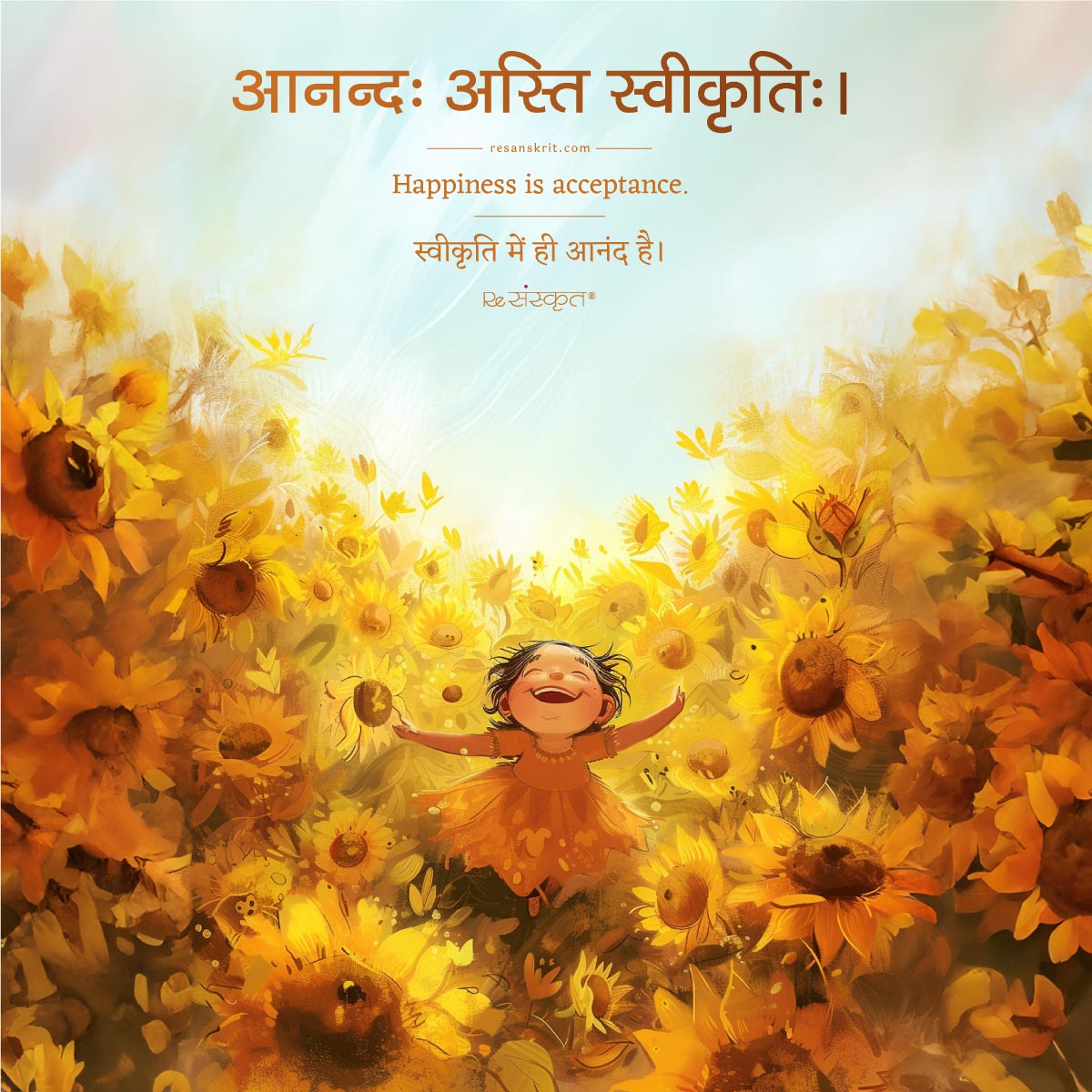
आनन्दः अस्ति स्वीकृतिः।
Transliteration:
ānandaḥ asti svīkṛtiḥ।
Hindi translation:
स्वीकृति में ही आनंद है।
English translation:
Happiness is acceptance.
Sanskrit Quote on being cautious!
Source - सूक्तिसुधातरङ्गिणी 5

अजित्वा नैव कुर्वीत कदापि जयघोषणाम्।
Transliteration:
ajitvā naiva kurvīta kadāpi jayaghoṣaṇām।
Hindi translation:
विजय प्राप्त करने से पहले उत्सव न मनाएं।
English translation:
Don't celebrate your triumph before you
have won.
Sanskrit Quote on wisdom in unexpected places!
Source - Hitopadesha 2.79 (हितोपदेशः 2.79)

बालादपि गृहीतव्यं युक्तमुक्तं मनीषिभिः।
रवेरविषये किं न प्रदीपस्य प्रकाशनम्॥
Transliteration:
bālādapi gṛhītavyaṃ yuktamuktaṃ manīṣibhiḥ।
raveraviṣaye kiṃ na pradīpasya prakāśanam॥
Hindi translation:
बच्चों के द्वारा कही गई सही बात भी
विद्वानों को स्वीकार कर लेनी चाहिए।
क्या सूर्य के अभाव में छोटा दिया प्रकाश नहीं करता?
English translation:
Sensible words, even if coming from a
child, should be accepted by the learned.
Doesn't a lamp illuminate where the sun cannot?
Sanskrit Quote on Courage and excuses!
Source - भोजप्रबन्ध 169
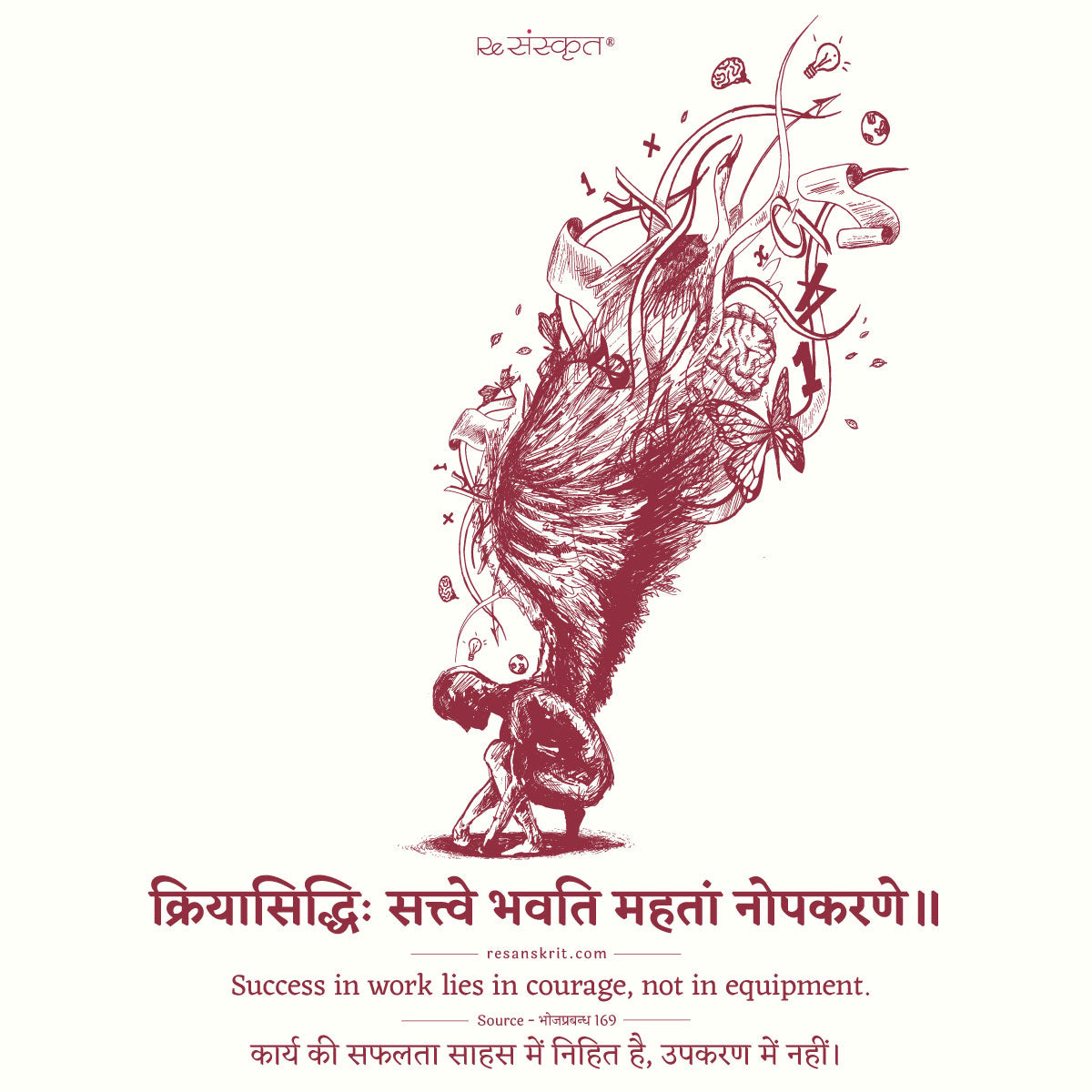
क्रियासिद्धिः सत्त्वे भवति महतां नोपकरणे॥
Transliteration:
kriyāsiddhiḥ sattve bhavati mahatāṃ
nopakaraṇe॥
Hindi translation:
कार्य की सफलता साहस में निहित है, उपकरण
में नहीं।
English translation:
Success in work lies in courage, not in
equipment.
Sanskrit Quote - Opportunity
Source - मुद्राराक्षस 1.3
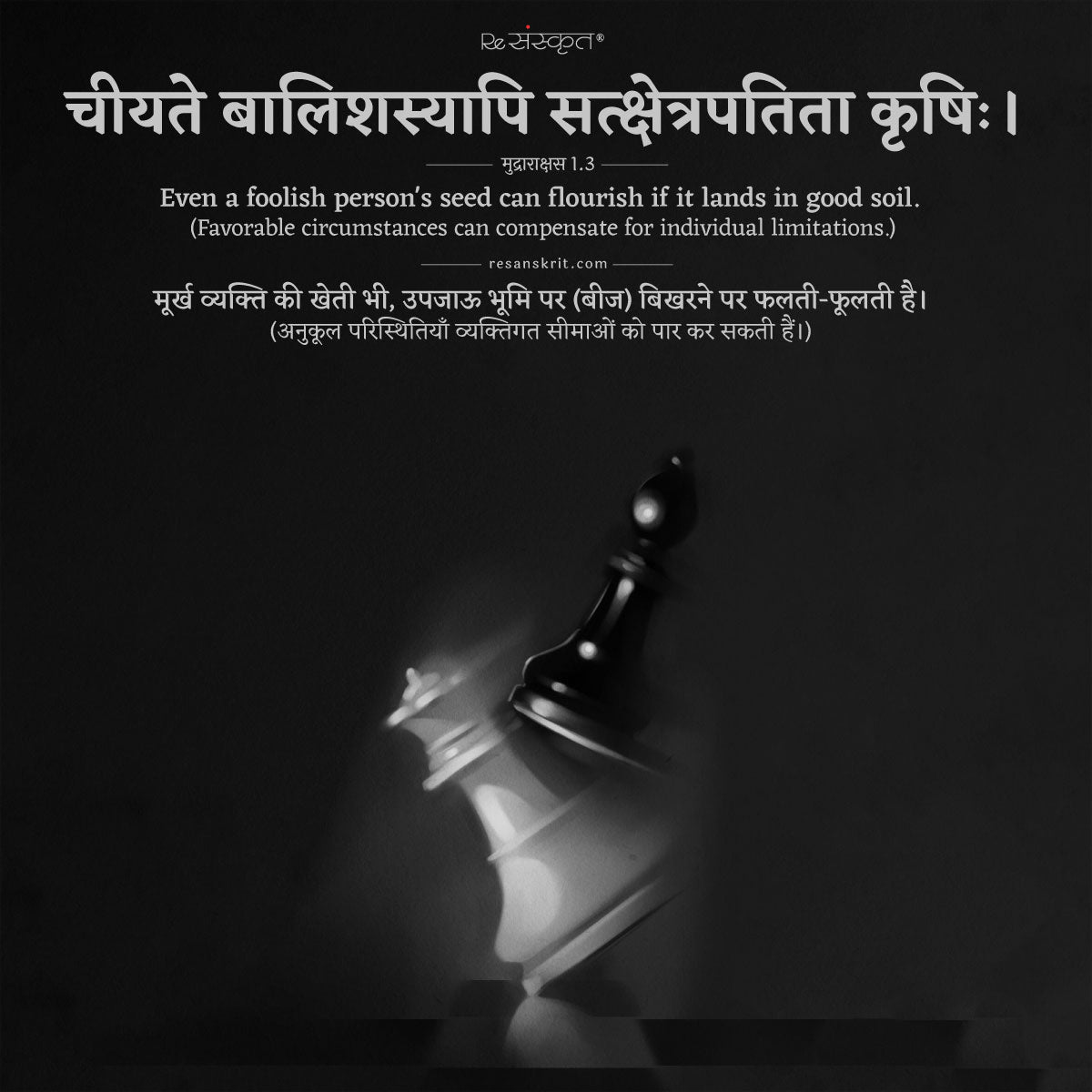
चीयते बालिशस्यापि सत्क्षेत्रपतिता कृषिः।
न शालेः स्तम्बकरिता वप्तुर्गुणमपेक्षते॥
Transliteration:
cīyate bāliśasyāpi satkṣetrapatitā kṛṣiḥ।
na śāleḥ stambakaritā vapturguṇamapekṣate॥
Hindi translation:
मूर्ख व्यक्ति की खेती भी, उपजाऊ भूमि पर
(बीज) बिखरने पर फलती-फूलती है;
शालि (चावल) की वृद्धि, बोने वाले व्यक्ति के गुणों पर निर्भर नहीं करती है।
English translation:
Even a foolish person's seed can
flourish if it lands in good soil.
The quality of the rice doesn't depend on the planter's personal
qualities.
Sanskrit Quote - The Power of Practice from Yogavasistha
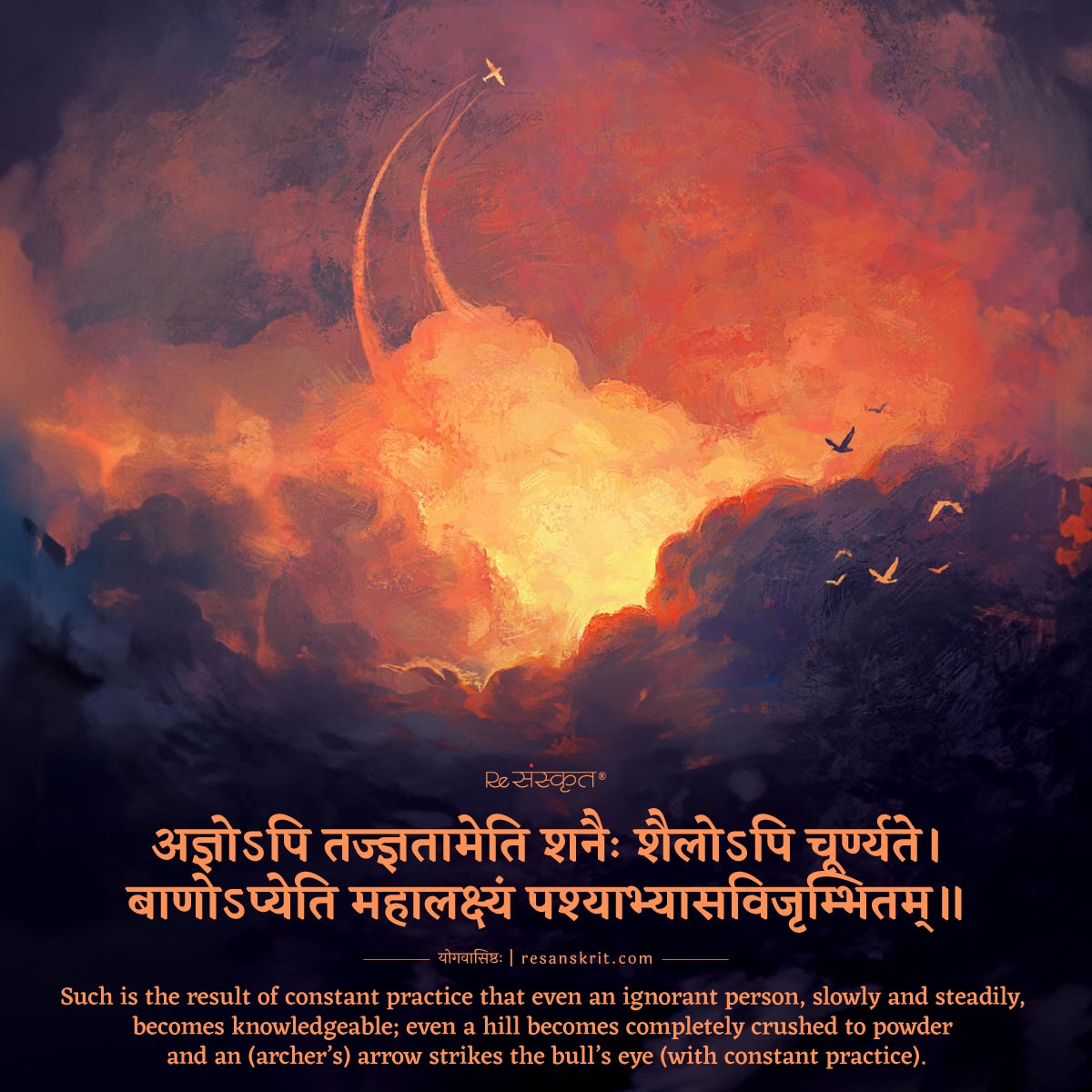
अज्ञोऽपि तज्ज्ञतामेति शनैः शैलोऽपि चूर्ण्यते।
बाणोऽप्येति महालक्ष्यं पश्याभ्यासविजृम्भितम्॥
Transliteration:
ajño'pi tajjñatāmeti śanaiḥ śailo'pi
cūrṇyate।
bāṇo'pyeti mahālakṣyaṃ paśyābhyāsavijṛmbhitam॥
Hindi translation:
अभ्यास करने की (साधना/उद्यम की) शक्ति
इतनी है की अज्ञानी व्यक्ति भी धीरे धीरे और निरंतरता से ज्ञानी बन जाता है; यहा तक की पहाड भी चूर्ण हो जाते है और
तीर भी सूक्ष्म निशाने पे अचूक लगता है।
English translation:
Such is the result of constant practice
that even an ignorant person, slowly and steadily, becomes knowledgeable; even a hill becomes completely crushed
to powder and an (archer’s) arrow strikes the bull’s eye (with constant practice).
Sarve Bhavantu Sukhinah - Complete Prayer Recitation - Meaning in English
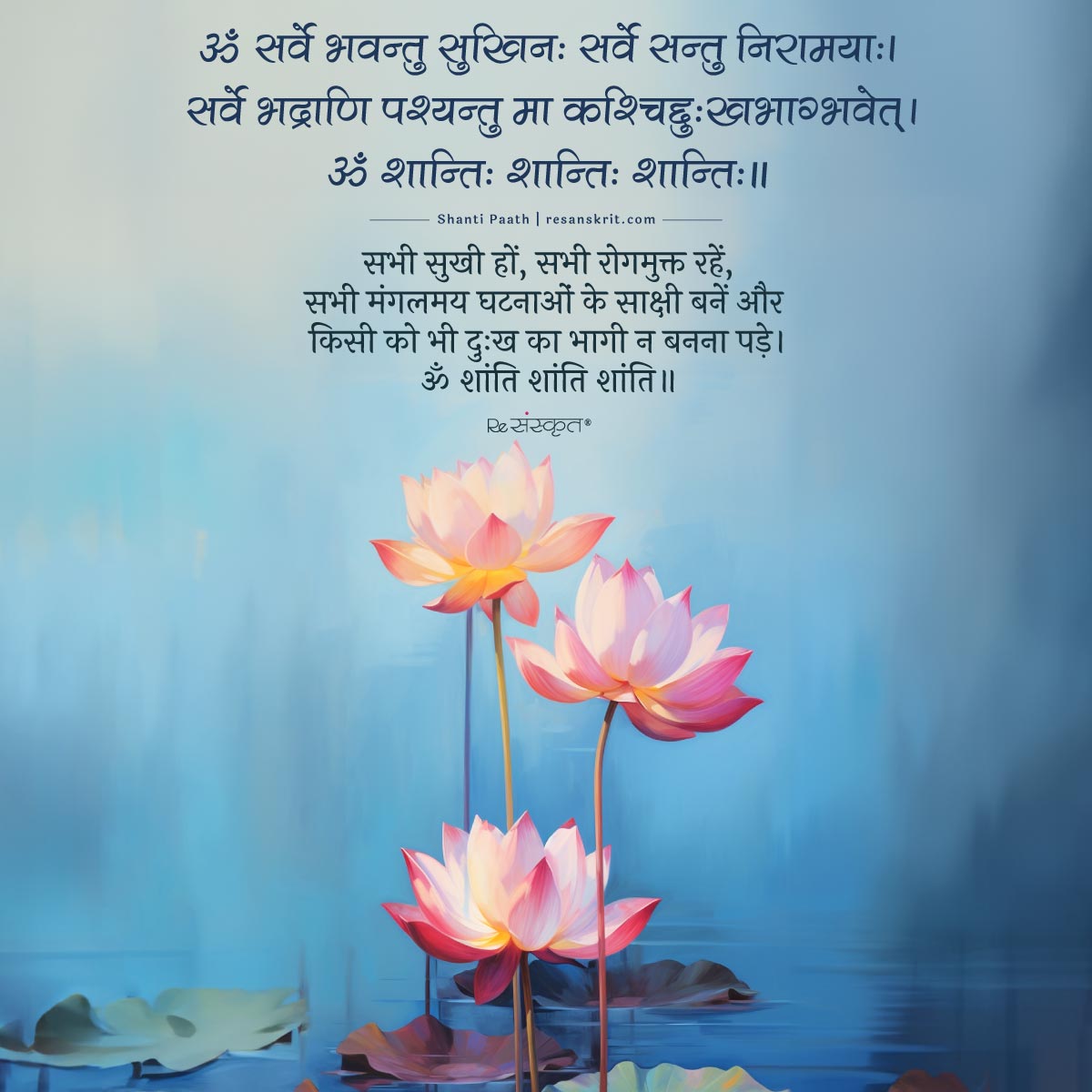
ॐ सर्वे भवन्तु सुखिनः सर्वे सन्तु निरामयाः।
सर्वे भद्राणि पश्यन्तु मा कश्चिद्दुःखभाग्भवेत्।
ॐ
शान्तिः शान्तिः शान्तिः॥
Transliteration:
oṃ sarve bhavantu sukhinaḥ sarve santu
nirāmayāḥ।
sarve bhadrāṇi paśyantu mā kaścidduḥ khabhāgbhavet।
oṃ śāntiḥ śāntiḥ śāntiḥ॥
Hindi translation:
सभी सुखी हों, सभी रोगमुक्त रहें,
सभी
मंगलमय घटनाओं के साक्षी बनें और किसी को भी दुःख का भागी न बनना पड़े।
ॐ शांति शांति शांति॥
English translation:
May all beings be at peace, may no one
suffer from illness,
May all see what is auspicious, may no one suffer.
Om peace, peace, peace.
Purnamadah Purnamidam - Law of Infinity - Sanskrit Quote from Upanishad
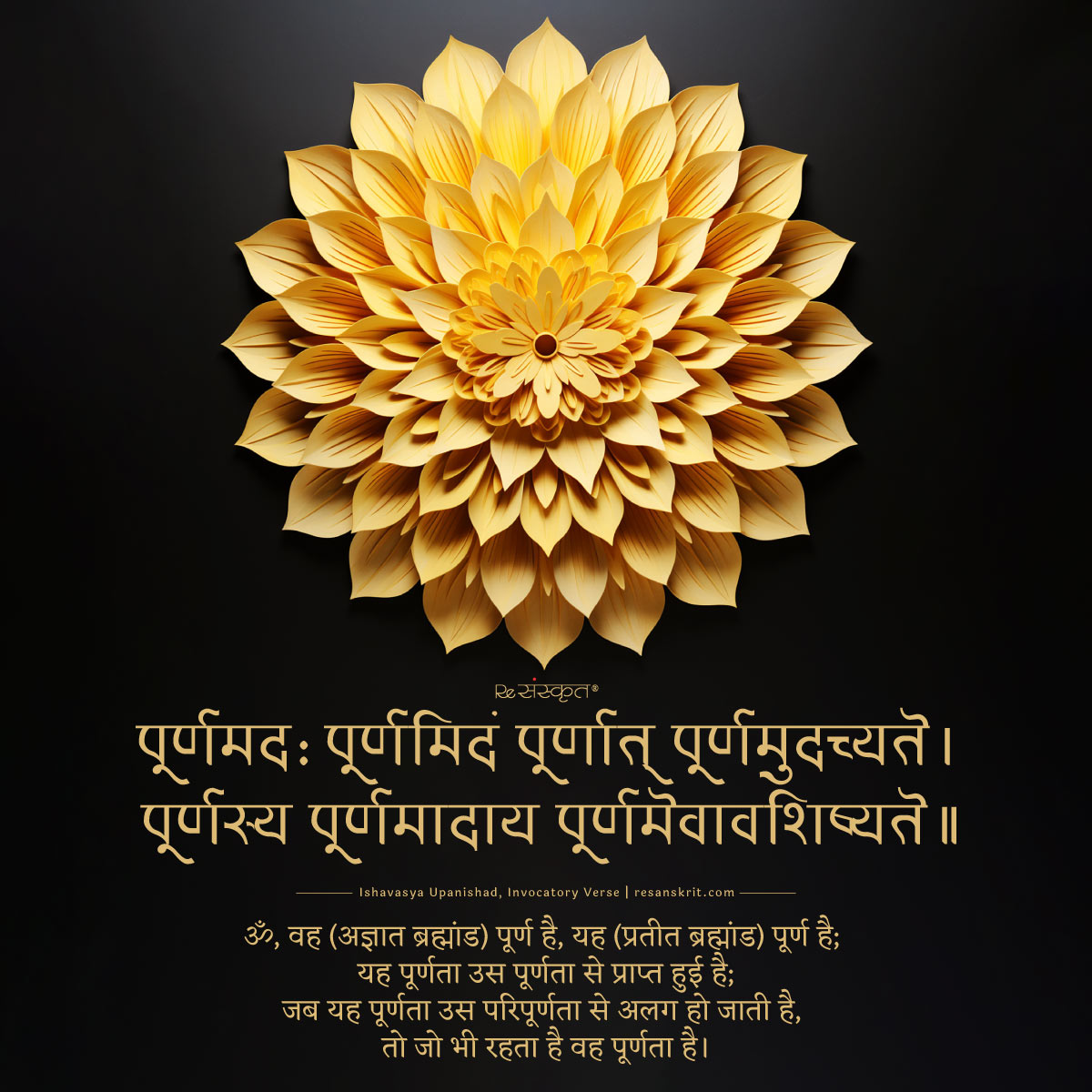
पूर्णमदः पूर्णमिदं पूर्णात् पूर्णमुदच्यते।
पूर्णस्य पूर्णमादाय पूर्णमेवावशिष्यते॥
Transliteration:
pūrṇamadaḥ pūrṇamidaṃ pūrṇāt
pūrṇamudacyate।
pūrṇasya pūrṇamādāya pūrṇamevāvaśiṣyate॥
Hindi translation:
वह (अज्ञात ब्रह्मांड) पूर्ण है, यह
(प्रतीत ब्रह्मांड) पूर्ण है; यह पूर्णता उस पूर्णता से प्राप्त हुई है;
जब यह पूर्णता उस परिपूर्णता से अलग हो
जाती है, तो जो भी रहता है वह पूर्णता है।
English translation:
What is visible is the infinite. What
is invisible is also the infinite.
Out of the Infinite Being the finite has come, yet being infinite, only
infinite remains.
Sanskrit Morning Prayer - Karagre Vasate Lakshmi Meaning

कराग्रे वसते लक्ष्मी करमध्ये सरस्वती।
करमूले तु गोविन्दः प्रभाते करदर्शनम्॥
Transliteration:
karāgre vasate lakṣmī karamadhye sarasvatī।
karamūle tu govindaḥ prabhāte karadarśanam॥
Hindi translation:
हथेली के अग्रभाग में देवी लक्ष्मी का
निवास है, हथेली के मध्यभाग में देवी सरस्वती निवास करती हैं
तथा हथेली के मूलभाग में भगवान् गोविंद रेहते हैं,
अतः प्रातः काल में हथेलियों का दर्शन करना चाहिए।
English translation:
Lakshmi, Saraswati, and Govinda reside
in the top, middle, and bottom of the palms, respectively.
Look at your palms in the morning and
contemplate their blessings.
Sanskrit quote - Trees and Consciousness
Source - Manusmriti 1.49
As per Hindu spiritual belief, conscious entities are classified as mobile (cara/चर) and immobile (acara/अचर). Mobile entities are those that can move, such as humans, snakes, gods, planets, elephants, etc. Immobile ones are those that cannot move, such as trees, mountains, rocks, etc. Even the immobile entities are said to have an inner self and a consciousness (in the spiritual sense), even though they may lack sentience altogether. The inner self (ātman/आत्मन्, often referred to as the soul) is said to be immortal and does not die even when the physical body dies. The inner self transmigrates and is reborn in another body, which is believed to depend on the individual’s accumulated actions (karman/कर्मन्). Actions can give rise to one of three qualities of being (guṇa/गुण): darkness (tamas/तमस्), passion (rajas/रजस्), and truth (sattva/सत्त्व), which has a bearing on which body the inner self will get in the next birth. Trees being an immobile form, they are referred to as being surrounded by darkness (tamas), signifying a lower form of consciousness, because of their accumulated actions. And yet, they are said to possess inner consciousness, referring to the presence of spiritual (and biological) life in them.

तमसा बहुरूपेण वेष्टिताः कर्महेतुना।
अन्तःसंज्ञा भवन्त्येते सुखदुःखसमन्विताः॥
Transliteration:
tamasā bahurūpeṇa veṣṭitāḥ karmahetunā।
antaḥsaṃjñā bhavantyete sukhaduḥkhasamanvitāḥ॥
Hindi translation:
ये (पेड़) अपने कर्म के कारण एनेक प्रकार
के अंधकार से संवेष्टित होते हैं।
उनमें अंदरूनी चेतना है और वे सुख-दुःख का अनुभव करते हैं।
English translation:
These (trees) are surrounded by
manifold darkness,
which is the result of their acts, and have inner consciousness and experience joy and
sorrow.
Sanskrit quote - Importance of health
Source - चरकसंहिता निदानस्थान (carakasaṃhitā nidānasthāna) 6.7

सर्वमन्यत्परित्यज्य शरीरमनुपालयेत्।
तदभावे हि भावानां सर्वाभावः शरीरिणाम्॥
Transliteration:
sarvamanyatparityajya śarīramanupālayet।
tadabhāve hi bhāvānāṃ sarvābhāvaḥ śarīriṇām॥
Hindi translation:
बाकी सब छोड़ कर अपने शरीर का खयाल रखना
चाहिए।
शरीर (स्वास्थ्य) के अभाव से प्राणियों में सभी चीज़ों का अभाव होता है।
English translation:
Setting aside everything else, one
should take care of one’s body.
In the absence of the body (good health), the organism lacks everything.
Sanskrit quote - Knowing one's worth
Source - Kumarasambhavam 5.45

दिवं यदि प्रार्थयसे वृथा श्रमः पितुः प्रदेशास्तव देवभूमयः।
अथोपयन्तारमलं समाधिना न रत्नमन्विष्यति
मृग्यते हि तत्॥
Transliteration:
divaṃ yadi prārthayase vṛthā śramaḥ pituḥ
pradeśāstava devabhūmayaḥ।
athopayantāramalaṃ samādhinā na ratnamanviṣyati mṛgyate hi tat॥
Hindi translation:
हे गौरि! यदि तुम स्वर्गप्राप्ति के लिए
प्रार्थना करती हो तो तप करने का परिश्रम करना व्यर्थ है, क्योंकि तुम्हारे पिता का राज्य (प्रदेश) ही देव भूमि है।
अथवा पति पाने के लिए तुम तपस्या कर रही हो तो समाधि लगाना व्यर्थ है। रत्न किसी को नहीं ढूंढता है बल्कि लोग ही
रत्न खोजने जाते हैं।
English translation:
O Gauri! If your prayers are aimed at
attaining heavenly rewards, then the labour of penance becomes futile, as your father’s dominion itself is the
abode of celestial beings. Alternatively, if you engage in penance to secure a husband, then the pursuit of
meditation is in vain, just as a gem does not seek its possessor; it is the seekers who discover the gem.
Sanskrit quote - Friendship Day 2023
Source - Panchatantra 2.61

केनामृतमिदं सृष्टं मित्रमित्यक्षरद्वयम्।
आपदां च परित्राणं शोकसन्तापभेषजम्॥
Transliteration:
kenāmṛtamidaṃ sṛṣṭaṃ mitramityakṣaradvayam।
āpadāṃ ca paritrāṇaṃ śokasantāpabheṣajam॥
Hindi translation:
किसने “मित्र” इन दो अक्षरों के रूप में इस
अमृत को रचा है?
जो संकट से छुड़ाता है और दुःख में साथ देता है वही मित्र है।
English translation:
Who crafted this nectar in the shape of
two syllables “mitra” (friend)?
The one who rescues from difficult situations and helps in grief is a
friend.
Sanskrit quote - On Good Qualities
Source - Raghuvansham - 3.62

तथापि शस्त्रव्यवहारनिष्ठुरे विपक्षभावे चिरमस्य तस्थुषः।
तुतोष वीर्यातिशयेन वृत्रहा पदं हि सर्वत्र
गुणैर्निधीयते॥
Transliteration:
tathāpi śastravyavahāraniṣṭhure
vipakṣabhāve ciramasya tasthuṣaḥ।
tutoṣa vīryātiśayena vṛtrahā padaṃ hi sarvatra guṇairnidhīyate॥
Hindi translation:
शस्त्रों के निष्ठुर प्रयोग और चिर
विपक्षभाव के होते हुए भी इन्द्र रघु की वीरता से प्रसन्न था।
अच्छे गुण शत्रुओं पर भी छाप छोड़ते हैं।
English translation:
Even amid the harsh usage of weapons
and his steadfast opposition, Indra was gladdened with Raghu’s valour.
Indeed, one’s good qualities leave a
mark (are admired) even among enemies.
Sanskrit quote - The purpose of prosperity
Source - Nitishastra 66

नद्यः स्वयमेव नाम्भः खादन्ति न स्वादु फलानि वृक्षाः।
पयोधराः सस्यमदन्ति नैव परोपकाराय सतां विभूतयः॥
Transliteration:
nadyaḥ svayameva nāmbhaḥ khādanti na svādu
phalāni vṛkṣāḥ।
payodharāḥ sasyamadanti naiva paropakārāya satāṃ vibhūtayaḥ॥
Hindi translation:
नदियाँ (अपना) पानी स्वयं नहीं पीती हैं,
वृक्ष (अपने) स्वादु फल (स्वयं) नहीं खाते हैं, बादल (स्वयं) अनाज नहीं खाते हैं,
सज्जनों का वैभव परोपकार के
लिये (होना चाहिए)।
English translation:
The rivers do not drink their own
water; the trees do not eat their own tasty fruits;
the clouds do not eat the crop themselves, Wealth of the
virtuous ones (should be) for helping others.
Sanskrit quote - The definition of truth
Source - Mahabharata Shanti Parva 12.316.13

सत्यस्य वचनं श्रेयः सत्यादपि हितं भवेत्।
यद्भूतहितमत्यन्तमेतत्सत्यं मतं मम॥
Transliteration:
satyasya vacanaṃ śreyaḥ satyādapi hitaṃ
bhavet।
yadbhūtahitamatyantametatsatyaṃ mataṃ mama॥
Hindi translation:
सच बोलना अच्छा है, तथा सत्य हितकारी है।
मेरा मानना है कि जो सभी प्राणियों के लिए अत्यंत हितकारी है, वही सत्य है। - नारद मुनि
English translation:
Speaking the truth is always good, and
even the truth shall be beneficial.
I believe what is extremely beneficial for all living beings is indeed
the truth. - Narad Muni
Sanskrit quote - Ati Sarvatra Varjayet
Source - Chanakya Neeti 3-12

अति रूपेण वै सीता चातिगर्वेण रावणः।
अतिदानाद बलिर्बद्धो ह्यति सर्वत्र वर्जयेत्॥
Transliteration:
ati rūpeṇa vai sītā cātigarveṇa rāvaṇaḥ।
atidānāda balirbaddho hyati sarvatra varjayet॥
Hindi translation:
अधिक सुन्दरता के कारण ही सीता का हरण हुआ
था,
अति घमंडी हो जाने पर रावण मारा गया
तथा अत्यन्त दानी होने से राजा बलि को छला गया था,
अतः हर
स्थिति में अतिरेक टालना चाहिए।
English translation:
Sita was kidnapped because of her
extraordinary beauty.
It was the inordinate pride that led to Ravana's demise.
Due to his extraordinary
acts of charity, Raja Bali had to be put in bonds.
That's why, in every situation, extremity should be
avoided.
Sanskrit quote - Sheelam Param Bhushanam
Source - Nitishatakam 83

ऐश्वरस्य विभूषणं सुजनता शौर्यस्य वाक्संयमः
ज्ञानस्योपशमः श्रुतस्य विनयो वित्तस्य पात्रे व्ययः।
अक्रोधः तपसः क्षमा प्रभवितुः धर्मस्य निर्व्याजता
सर्वेषामपि सर्वकारणमिदं शीलं परं भूषणम्॥
Transliteration:
aiśvarasya vibhūṣaṇaṃ sujanatā śauryasya
vāksaṃyamaḥ
jñānasyopaśamaḥ śrutasya vinayo vittasya pātre vyayaḥ।
akrodhaḥ tapasaḥ kṣamā prabhavituḥ
dharmasya nirvyājatā
sarveṣāmapi sarvakāraṇamidaṃ śīlaṃ paraṃ bhūṣaṇam॥
Hindi translation:
बड़प्पन महानता का आभूषण है; वाणी पर संयम,
साहस का;
शांति, ज्ञान की; आज्ञाकारिता, सीखने की; धन का बुद्धिमान खर्च;
किसी के क्रोध पर नियंत्रण,
तपस्या का; धैर्य, कार्यकुशलता का; सरलता, धर्म का;
अच्छा चरित्र उपरोक्त सभी गुणों का आधार है और सबसे बड़ा
आभूषण है।
English translation:
Nobility is the ornament of greatness;
restraint over speech, of courage;
Calmness, of knowledge; obedience, of learning; wise spending of wealth;
Control of one’s anger, of penance; patience, of efficiency, straight-forwardness, of dharma;
Good
character is the base for all the above qualities and is the greatest ornament of all.
Sanskrit quote on soul
Shvetashvataropanishad 3.20

अणोरणीयान्महतो महीयान्।
Transliteration:
aṇoraṇīyānmahato mahīyān।
Hindi translation:
आत्मा अणु से भी सूक्ष्म और बड़े से भी
बड़ा है।
English translation:
The self is smaller than an atom and
greater than the great.
Sanskrit quote on how to control the mind
Māṇḍūkyopaniṣad Kārikā 3.44
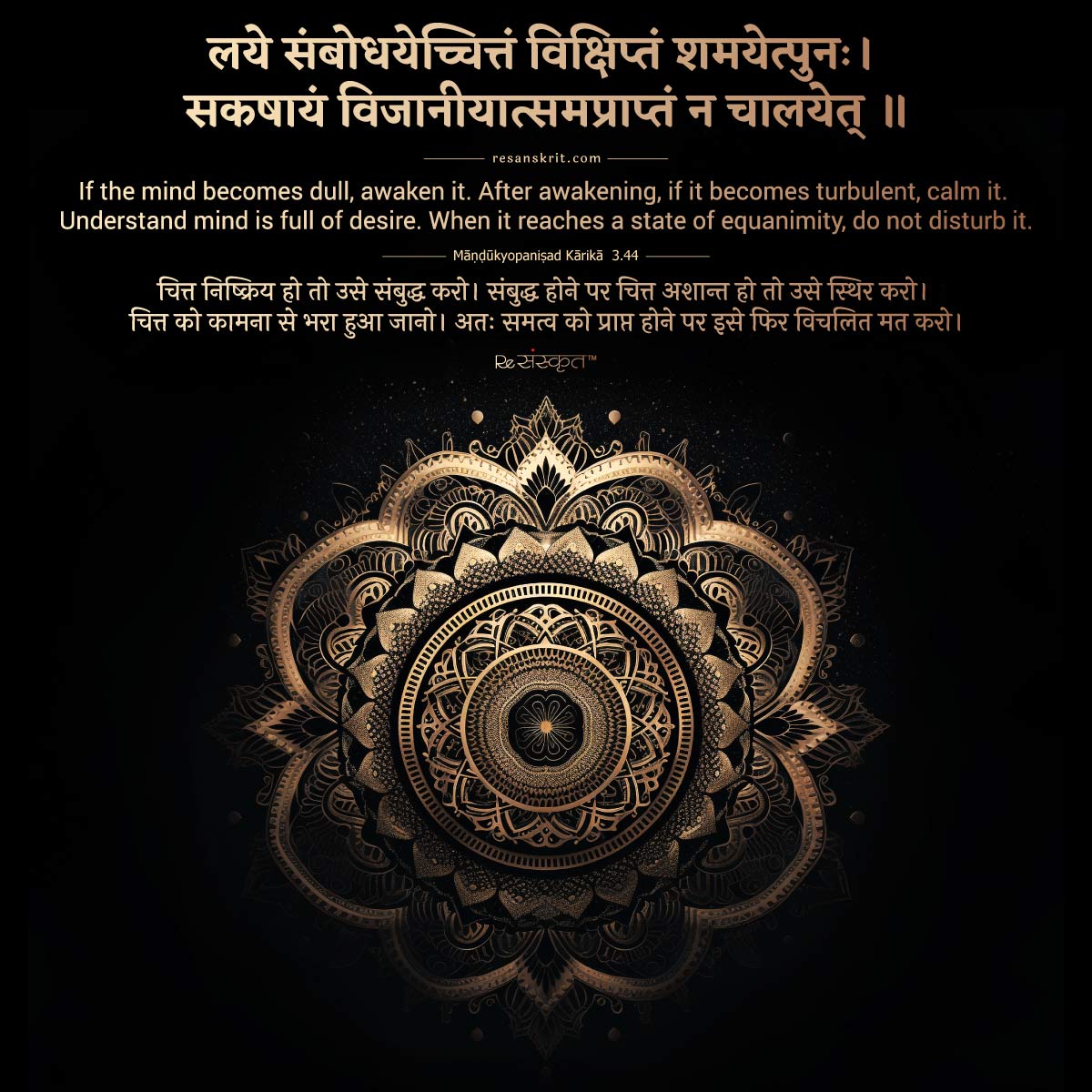
लये संबोधयेच्चित्तं विक्षिप्तं शमयेत्पुनः।
सकषायं विजानीयात्समप्राप्तं न चालयेत् ॥
Transliteration:
laye saṃbodhayeccittaṃ vikṣiptaṃ
śamayetpunaḥ।
sakaṣāyaṃ vijānīyātsamaprāptaṃ na cālayet ॥
Hindi translation:
चित्त निष्क्रिय हो तो उसे संबुद्ध करो।
संबुद्ध होने पर चित्त अशान्त हो तो उसे स्थिर करो। चित्त को कामना से भरा हुआ जानो।
अतः समत्व को प्राप्त होने
पर इसे फिर विचलित मत करो।
English translation:
If the mind becomes dull, awaken it.
After awakening, if it becomes turbulent, calm it. Understand it to be full of desire.
When it has thus
reached a state of equanimity, do not disturb it again.
Sanskrit quote from rigveda on not losing the path
ऋग्वेद:- १०.५७.०१ (ṛgveda:- 10.57.01)

मा प्र गाम पथो वयम्।
Transliteration:
mā pra gāma patho vayam।
Hindi translation:
हम (सही) पथ से न भटकें।
English translation:
Let us not leave the (right) path.
Sanskrit quote on promises
kirātārjunīyam 1.4 (किरातार्जुनीयम् १.४)

व्रताभिरक्षा हि सतामलङ्क्रिया।
Transliteration:
vratābhirakṣā hi satāmalaṅkriyā।
Hindi translation:
अपने व्रत का पालन करना ही सज्जन का आभूषण
है।
English translation:
Keeping one’s vow is the ornament of
the virtuous.
Sanskrit quote on harsh words
kirātārjunīyam 1.4 (किरातार्जुनीयम् १.४)
Painful and bitter things are good for you
including words.

हितं मनोहारि च दुर्लभं वचः।
Transliteration:
hitaṃ manohāri ca durlabhaṃ vacaḥ।
Hindi translation:
जो हितकारी और प्रिय भी हों, ऐसे वचन
दुर्लभ हैं।
English translation:
Words that are beneficial and also
delightful are rare.
Sanskrit quote on fire
Source - तैत्तिरीय-ब्राह्मणम् 1.2.1.20/p (taittirīya-brāhmaṇam 1.2.1.20/p)
Our ancestors
gave a lot of importance to fire (Agni), and rightly so. Without which nothing around you would exist.
Taken
from the कृष्णयजुर्वेदीय तैत्तिरीयब्राह्मण, this verse addresses Jātavedas (Agni). A more relatable translation
would be.
"I am from the fire; the fire is from me. I am the source of the fire; the fire is my source."

अहं त्वदस्मि मदसि त्वम्।
Transliteration:
ahaṃ tvadasmi madasi tvam।
Hindi translation:
मैं तुझसे हूँ, तू मुझसे है।
English translation:
I am from you; you are from me.
Original text with Vedic accents:
अ॒हं त्वद॑स्मि॒ मद॑सि॒
त्वमे॒तत्।
Sanskrit phrase on duality of nature
Source - मृच्छटिकम् १.१० (mṛcchaṭikam 1.10)
Anything has value as long as your mind
remembers what it was like living without it. You can apply this to almost anything like material, money,
conveniences, relationships, and even your own body. So next time you face an obstacle, remember how satisfactory
overcoming it is going to be.

सुखं हि दुःखान्यनुभूय शोभते घनान्धकारेष्विव दीपदर्शनम्।
Transliteration:
sukhaṃ hi duḥkhānyanubhūya śobhate
ghanāndhakāreṣviva dīpadarśanam।
Hindi translation:
दुःख अनुभव करने के बाद सुख का मान अधिक
होता है,
जैसे घने अन्धेरे में एक दीपक से सब कुछ प्रदीप्त हो जाता है।
English translation:
Happiness is better appreciated after
experiencing sorrow,
just like light from a small lamp illuminates everything in pitch darkness.
Sanskrit phrase on loving yourself
Source - not available

स्वात्मनि स्निह्येत्।
Transliteration:
svātmani snihyet।
Hindi translation:
स्वयं से प्रेम करो।
English translation:
Love yourself.
Sanskrit Quote on Mind/intellect
Source - सुभषितरत्नभाण्डागारम्, सामन्यनीतिः 521 (subhaṣitaratnabhāṇḍāgāram, sāmanyanītiḥ 521)

वयसनेष्वेव सर्वेषु यस्य बुद्धिर्न हीयते।
स तेषां पारमभ्येति तत्प्रभावादसंशयम्॥
Transliteration:
vayasaneṣveva sarveṣu yasya buddhirna
hīyate।
sa teṣāṃ pāramabhyeti tatprabhāvādasaṃśayam॥
Hindi translation:
विपत्तियों में अपंग न होने वाली बुद्धि ही
उसे
उन विपदाओं से निकलने में सहायता करती है।
English translation:
The mind that does not cripple in
adversities,
helps him/her get out of those very calamities.
Sanskrit Quote on Belief

यद्भावो तद्भवति।
Transliteration:
yadbhāvo tadbhavati।
Hindi translation:
जैसी धारणा, वैसे आप।
English translation:
You become what you believe in.
Sanskrit Quote from Tarkasaṅgrahaḥ
Source – तर्कसङ्ग्रहः 31 (tarkasaṅgrahaḥ 31)
When we say we 'know' something, we either retrieve a memory of it (having experienced it ourselves or having heard or read about it) or are experiencing it at the moment. The 'experience' aspect of knowledge features in René Descartes's famous "I think, therefore I am", where he deduces his own existence from the knowledge (present experience) that he is thinking (at the present moment). When he's no longer consciously aware of these thoughts, the knowledge about his existence comes from the memory of the above deduction from present experience. Here 'experience' is not in the sense of 'past experience' or 'accumulated experiences', which is simply a 'memory', the other form of knowledge. So the question to be asked here is, who we really are?

स्मृतिभिन्नं ज्ञानमनुभवः।
Transliteration:
smṛtibhinnaṃ jñānamanubhavaḥ।
Hindi translation:
अनुभव स्मृति से अलग एक ज्ञानावस्था है।
English translation:
Experience is a state of knowledge
apart from memory.
Sanskrit Quote from Kathasaritsagar on worthy of being rich
Source – Kathasaritsagara 3.1.140

वीरो हि स्वाम्यमर्हति।
Transliteration:
vīro hi svāmyamarhati।
Hindi translation:
जो वीर है, वही धनी होने के योग्य होता है।
English translation:
One who is brave is worthy of being
rich.

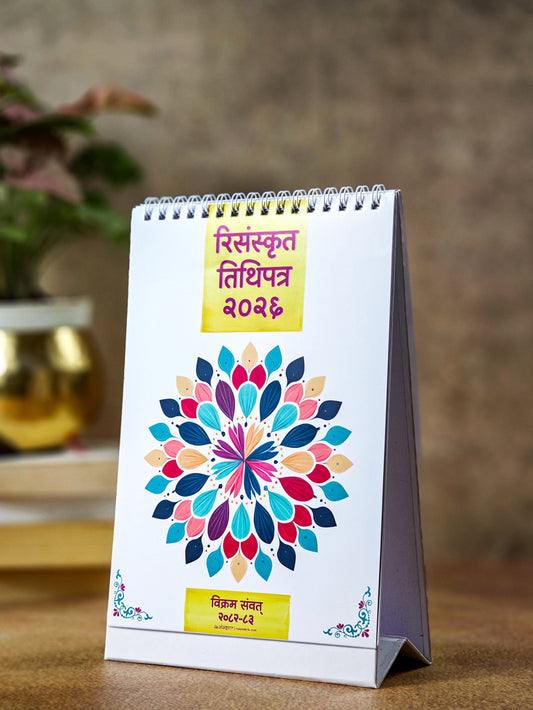



![[New Edition] ReSanskrit® 365 Days of Sanskrit Wisdom | Daily Sanskrit Quotes | With 100+ New Quotes, Hindi & English Translations🆕](http://resanskrit.com/cdn/shop/files/365-calendar-resanskrit-front-hero-shot_533x.jpg?v=1762351171)
![[New Edition] ReSanskrit® 365 Days of Sanskrit Wisdom | Daily Sanskrit Quotes | With 100+ New Quotes, Hindi & English Translations🆕](http://resanskrit.com/cdn/shop/files/365-calendar-resanskrit-quote-shot1_533x.jpg?v=1762351193)





7 Comments
This collection of Sanskrit shlokas is truly inspiring and beautifully explained in both Hindi and English. Thank you for preserving and sharing the richness of our ancient wisdom.
Respected Sir PLEASE give meaning of this sloka in hindi and also in english . Sanskrit Shlok = uttamash chintitam kuryat proktakaritu madhyama
Leave a comment
Please note, comments need to be approved before they are published.